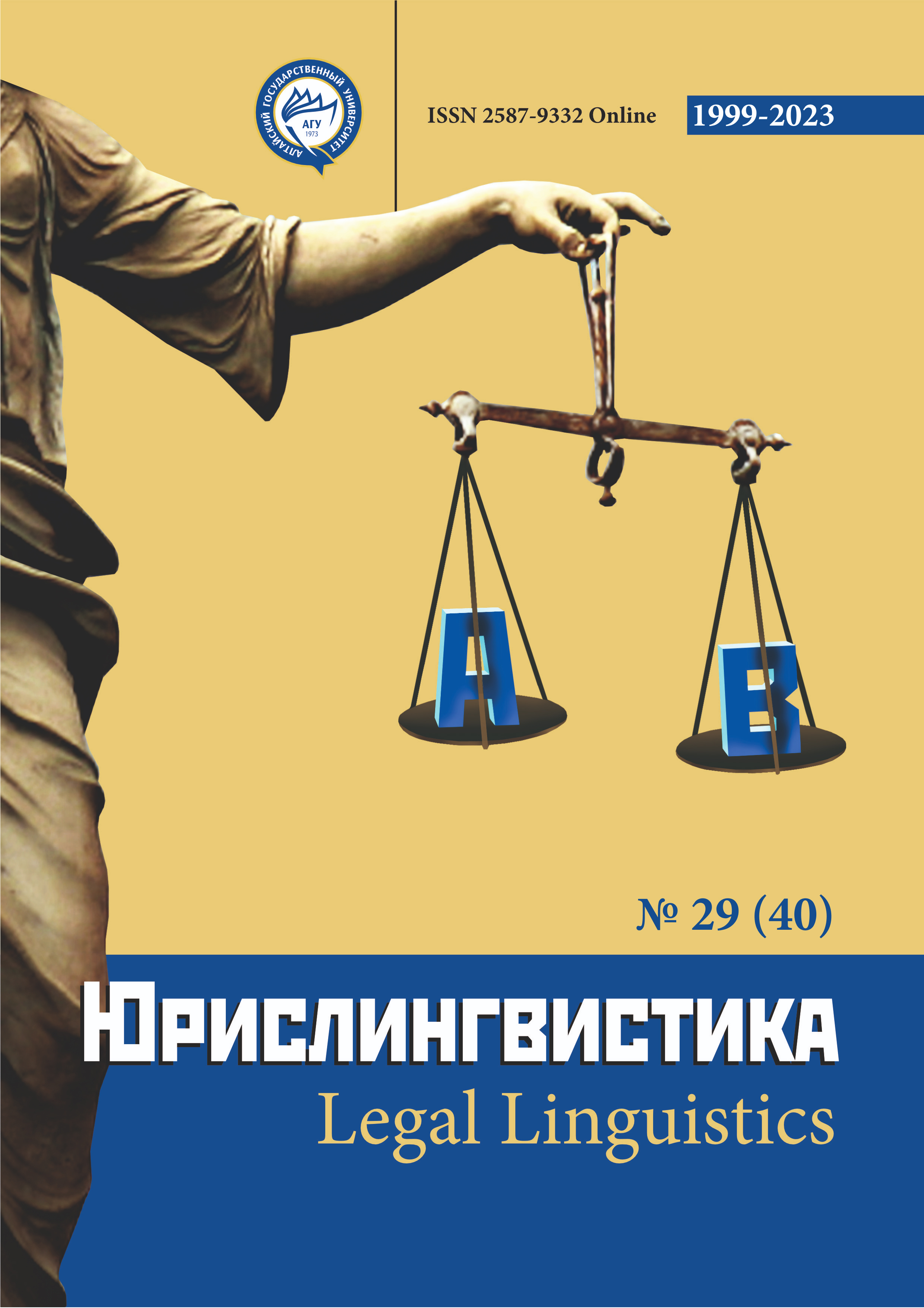On Terms Used in Defining the Corpus Delicti under Art. 133 of the Criminal Code of the Russian Federation
УДК 343.54 , ББК 67.408.113
Abstract
The article analyzes the terms used by the legislator when defining the disposition of the corpus delicti under Art. 133 of the Criminal Code of the Russian Federation. An analysis of the term «blackmail» is presented, which does not have a legal definition and requires clarification of the content. Since it is used not only in the construction of Article Art. 133 of the Criminal Code of the Russian Federation, but also a number of others, it is advisable to formalize the content of this term in a note to the article in which it is used for the first time - Art. 127.2 of the Criminal Code of the Russian Federation as follows: «In the articles of this Code, blackmail is understood as the threat of dissemination of information defaming the victim or their relatives, or other information that can cause significant harm to the rights or legitimate interests of the victim or their relatives». The criticism of the construction «use of material or other dependence of the victim» as a sign of the objective side of the considered corpus delicti is presented, and with examples from practice, the problems of qualification for it are considered. It is proposed to replace this construction with «under the threat of committing actions that violate the rights and legitimate interests of the victim, who is financially or otherwise dependent on the perpetrator». It is substantiated that outside the corpus delicti under Art. 133 of the Criminal Code of the Russian Federation, there remains a number of actions that have public danger, but also do not fall under the signs of other elements of sexual crimes. This made it possible to propose that a list of methods for committing the crime in question be left open, pointing out the threat of committing another criminal act. The necessity of the existence of different structures of the composition in different parts of the article, depending on the effectiveness of coercive actions, is substantiated. In conclusion, a new version of Art. 133 of the Criminal Code of the Russian Federation is proposed, taking into account the need to correct the terms that describe actions of a sexual nature.
Downloads
Metrics
References
Апелляционное постановление Московского областного суда от 26 августа 2014 г. по делу N 22к-4989/2014//https://demo.garant.ru/#/document/126583882/paragraph/1/doclist/3794/29/0/0/понуждение%20к%20действиям%20сексуального%20характера:50
Дядюн К. В. Понуждение к действиям сексуального характера: проблемы толкования и применения состава / Lex Russica. 2021. № 9. С. 54-65.
Конорезов Н. А. Понуждение к действиям сексуального характера: уголовно-правовая характеристика и проблемы квалификации: автореферат дис. ... кандидата юридических наук. Краснодар, 2022.
Конорезов Н. А. Проблемы интерпретации объективных признаков состава понуждения к действиям сексуального характера (Ст. 133 УК РФ) / Гуманитарные, социально-экономические и общественные науки. 2021. № 11 (2). С. 70-75.
Мотин А. В. К вопросу о способе совершения преступлений против половой неприкосновенности и половой свободы личности / Право и практика. 2017. № 1. С. 38.
Никитин Ю. А. Содержание шантажа: вопросы теории и практики / Вестник Омской юридической академии. 2016. N 3. С. 61-64.
Обзор судебной практики рассмотрения уголовных дел в кассационном порядке Верховного суда Чувашской Республики в 2003 году. https://demo.garant.ru/#/document/17602328/paragraph/1/doclist/3794/39/0/0/понуждение%20к%20действиям%20сексуального%20характера:61
Остапенко Т. Ю. Особенности понуждения к действиям сексуального характера / Законы России: опыт, анализ, практика. 2009. №12. С. 133-136.
Приговор Ленинского районного суда г. Барнаула от 11.05.2022 по делу № 2 -43/22 / Архив Ленинского районного суда г. Барнаула Алтайского края.
Справка Самарского областного суда по результатам проведенного анализа судебной практики рассмотрения уголовных дел о совершении преступлений в сфере компьютерных технологий. https://demogarant.ru/#/document/405909877/paragraph/1/doclist/4490/11/0/0/мужеложство,%20-%20это:0
Тыдыкова Н. В. О некорректном использовании медицинских терминов при конструировании составов половых преступлений в Уголовном кодексе Российской Федерации / Юрислингвистика. 2018. № 7-8. С. 56-63.
Шарапов Р. Д. Преступное насилие. 2009. С. 155.
Copyright (c) 2023 Надежда Тыдыкова

This work is licensed under a Creative Commons Attribution 4.0 International License.
The authors, which are published in this journal, agree to the following conditions:
1. Authors retain the copyright to the work and transfer to the journal the right of the first publication along with the work, at the same time licensing it under the terms of the Creative Commons Attribution License, which allows others to distribute this work with the obligatory indication of the authorship of this work and a link to the original publication in this journal .
2. The authors retain the right to enter into separate, additional contractual agreements for the non-exclusive distribution of the version of the work published by this journal (for example, to place it in the university depository or to publish it in a book), with reference to the original publication in this journal.
3. Authors are allowed to post their work on the Internet (for example, in a university repository or on their personal website) before and during the review process of this journal, as this may lead to a productive discussion, as well as more links to this published work (See The Effect of Open Access).











